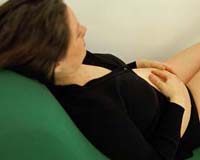| . |  |
. |
London (AFP) July 29, 2009 Do not shake hands, stop sharing communion wine during services and ban holy water from blessings and baptisms. These are some of the directives issued by Britain's religious leaders in recent days, following similar moves in other badly-affected countries to halt the spread of swine flu among their congregations. "People must understand that it's something that can be dealt with, that there's no need to panic," Rabbi Helen Freeman from the West London synagogue told AFP. Britain is the country hardest hit by the A(H1N1) virus in Europe with at least 30 deaths. Swine flu infected some 100,000 people in Britain last week, nearly double the figure from the week before. Archbishop of Canterbury Rowan Williams -- the head of the Anglican Church -- and Archbishop of York John Sentamu last week recommended priests stop congregations sipping from the same chalice until the pandemic has passed. According to tradition, during Holy Communion or the Eucharist, the chalice is offered to the faithful who, along with the priest, take a sip of wine before passing the cup on to their neighbour. The archbishops suggest pastors dip the communion wafer into the wine and put it into the hands, rather than the mouths of the faithful as a hygienic alternative, a technique widely used by the Anglican Church in Africa. The Reverend John Gladwin, the Bishop of Chelmsford, sent a series of guidelines to priests in his diocese of Essex in mid-July, advising against putting holy water into stoups, or fonts for holy water. "The water in stoups can easily become a source of infection and a means of rapidly spreading the virus," he said. "This practice should be suspended". In the diocese of Southwark in London, parishioners are invited to hug rather than shake hands with each other, during the "sign of peace", which traditionally marks the end of communion, to minimise physical contact. The Catholic Church in England and Wales pointed out that "there is no need yet to suspend mass, stop the sign of peace, withdraw communion under both kinds or take any kind of special measures." But "if the local situation warrants certain liturgical changes to help lessen the risk of spreading the virus the decision will rest with the local bishop," said a spokesman for the Catholic Bishops' Conference of England and Wales. In west London, Freeman's synagogue has launched an appeal for volunteers -- or "flu friends" -- to care for those people who already have it, and have to be isolated. The Muslim Council of Britain (MCB) said basic hygiene rules were "an inherent part of Islamic teaching", but urged imams to underline the need for care at Friday prayers and in Madrassas, or religious schools. The MCB has also urged those making the pilgrimage to Mecca to ensure they take "good personal hygiene measures, including cough etiquette, use of antiseptic hand gels and frequent hand washing with soap and water". It also underlined that the fact that Muslims do not eat pork does not protect them from the virus, which is transmitted mainly by talking, sneezing and coughing. Religious leaders in other countries hit hard by the pandemic have already taken similar steps, some earlier than others. In Mexico, where the virus first emerged and where 90 percent of the population is Catholic, measures were taken straightaway back in May, with some Sunday masses being cancelled and religious schools closed. But similar action was not taken in other countries until this month: in Brazil the Catholic Church recommended not holding hands during prayer, while Portugal took similar measures, and Polish Catholics have followed suit even though there have been no firm guidelines. In other Catholic states including France and Spain as well as Orthodox Greece there has been no change so far, while in Italy the Vatican has not ruled out suspending papal audiences held every week for thousands of pilgrims from around the world. In Britain religious leaders are reacting to the catching up.
Share This Article With Planet Earth
Related Links Epidemics on Earth - Bird Flu, HIV/AIDS, Ebola
 Pregnancy increases risk of swine flu complications: study
Pregnancy increases risk of swine flu complications: studyWashington (AFP) July 29, 2009 Pregnant women who contract swine flu are four times more likely to develop severe illness that requires hospitalization than other people infected with the virus, a US study showed Wednesday. They are also more likely to die of swine flu or even seasonal flu, and yet only 15 percent of pregnant women in the United States follow the advice of the Centers for Disease Control and Prevention ... read more |
|
| The content herein, unless otherwise known to be public domain, are Copyright 1995-2009 - SpaceDaily. AFP and UPI Wire Stories are copyright Agence France-Presse and United Press International. ESA Portal Reports are copyright European Space Agency. All NASA sourced material is public domain. Additional copyrights may apply in whole or part to other bona fide parties. Advertising does not imply endorsement,agreement or approval of any opinions, statements or information provided by SpaceDaily on any Web page published or hosted by SpaceDaily. Privacy Statement |